All set for verdicts
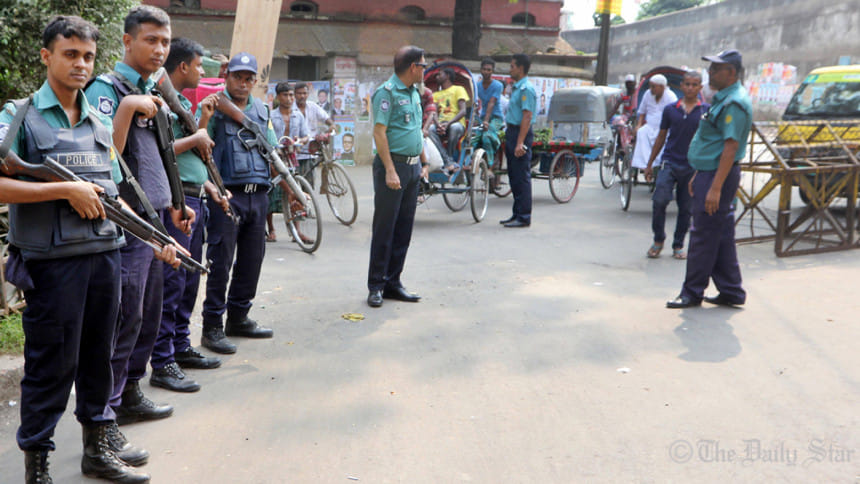
All eyes are on a special tribunal that is all set to deliver today the verdicts in two cases filed over the grisly grenade attack on an Awami League rally on August 21, 2004.
The attack, carried out to assassinate then opposition leader Sheikh Hasina, left 24 AL leaders and activists killed and over 300 others injured. Hasina survived with injuries to her ears.
Also read: Aug 21 Grenade Attack Cases: Trial completes after 14 years
The verdicts, to be delivered 14 years after the blasts on Bangabandhu Avenue, are likely to further heat up the political landscape ahead of the national election as several BNP leaders, including BNP acting chairman Tarique Rahman, are accused in the cases.
Fates of the then top police and intelligence officers accused in the cases will also be known this morning.
Prosecutors say the charges against the 49 accused are proven beyond reasonable doubt and they have sought the highest punishment. Defence lawyers, on the other hand, maintain that the prosecutors failed to prove the charges and hope their clients will be acquitted.
Judge Shahed Nuruddin of the Speedy Trial Tribunal-1 will pronounce the verdicts.
Security measures have been beefed up in and around the court area and across the country.
Home Minister Asaduzzaman Khan assured the countrymen that no untoward incident would take place.
“No one will be on the roads to save criminals," BSS quoted him as saying.
"We firmly believe that the court will give exemplary punishment to the perpetrators and masterminds behind the attack and the nation will be freed from another stigma with the delivery of the verdicts.”
Dhaka Metropolitan Police Commissioner Asaduzzaman Mia told a discussion at Rajarbagh Police Lines that officers were monitoring the overall situation to ensure security.
AL General Secretary Obaidul Quader told reporters that Tarique Rahman was the mastermind behind the attack.
His BNP counterpart Mirza Fakhrul Islam Alamgir was quick to declare that Tarique and other party leaders were falsely implicated by the government.
The grenade attack, allegedly masterminded by several BNP leaders, is one of the most shocking crimes in the country's history.
The attack and steps taken by the then BNP-led government in its aftermath left a deep scar in the country's politics as it sharpened the division between the AL and BNP.
The BNP and Jamaat-e-Islami, the parties that shared power at the time, had allegedly made efforts to bury the truth and protect the masterminds by derailing the investigation. They even tried to put the blame on the AL.
But further investigation into the cases revealed that the attack was an outcome of a collaboration between the militant outfit Huji, influential leaders of the BNP and Jamaat, and a band of senior officials of the home ministry, police, Directorate General of Forces Intelligence (DGFI), National Security Intelligence (NSI) and Prime Minister's Office.

ACCUSED PLANNERS
Besides then prime minister Khaleda Zia's son Tarique, eight others accused of conspiring and approving the plan of the attack include former BNP leaders and top government officials of the time. If found guilty, they may be awarded up to death sentence.
They are: former state minister Lutfozzaman Babar, former deputy minister Abdus Salam Pintu, former prime minister's political secretary Abul Harris Chowdhury, former lawmaker Kazi Shah Mofazzal Hossain Kaikobad, former DGFI director Brig Gen (retd) Rezzaqul Haider Chowdhury, former NSI DG Brig Gen (retd) Abdur Rahim, owner of Hanif Paribahan Mohammad Hanif, and BNP leader Ariful Islam Arif.
The attack was executed by Huji men and their accomplices.
LONG ROAD TO JUSTICE
Two cases -- one for murder and another under the Explosive Substances Act -- were filed with Motijheel Police Station.
The then BNP-led government formed a one-member judicial inquiry commission led by a High Court judge. Besides, the US Federal Bureau of Investigation (FBI) came to Dhaka to probe the grenade attack.
But, a few months later, senior CID officials made up the farcical Joj Mia story. They detained Joj along with 20 other petty criminals. Joj and two others were forced to give false confessions.
The real identities of the detainees were later revealed by the media and the ludicrous nature of the investigation was exposed by the end of 2004.
After a caretaker administration took over, the CID submitted two separate charge sheets in June 2007, accusing 22 persons including Mufti Hannan and Abdus Salam Pintu. The charge sheet hints at the involvement of some high-level government and security officials in the plot.
The trial began after charges were framed against them in October that year and the court recorded testimonies of 61 prosecution witnesses.
But, following the prosecution's petition, the court in August 2009 ordered further investigation and a new investigation officer was assigned.
The CID in July 2011 submitted supplementary charge sheet accusing 30 more individuals, including Tarique and Babar, taking the total number of accused to 52.
Of them, Mufti Hannan and Sharif Shahedul Alam Bipul were executed in a case filed for attacking the then UK high commissioner to Bangladesh Anwar Choudhury.
Ali Ahsan Mohammad Mojaheed, who was the secretary general of Jamaat and a minister, was hanged for committing crimes against humanity in 1971.
The re-trial in the two cases started concurrently in March 2012. The prosecution produced 225 witnesses to prove the charges while the defence produced 20.
The court completed the trial last month.

OTHER ACCUSED
Huji founder Abdus Salam and leaders Maulana Sheikh Farid, Maulana Abdur Rouf, Maulana Abdul Hannan Sabbir and 25 others, mostly militant outfit leaders, were accused of murder. If convicted, they may get maximum death penalty.
Former IGPs -- Ashraful Huda and Shahudul Haque -- have been charged with assisting the killers financially and administratively. They may face up to life-term imprisonment if found guilty.
Khaleda's nephew Lt Commander (retd) Saiful Islam Duke, former DGFI officials, former high-raking DMP officers are also accused.
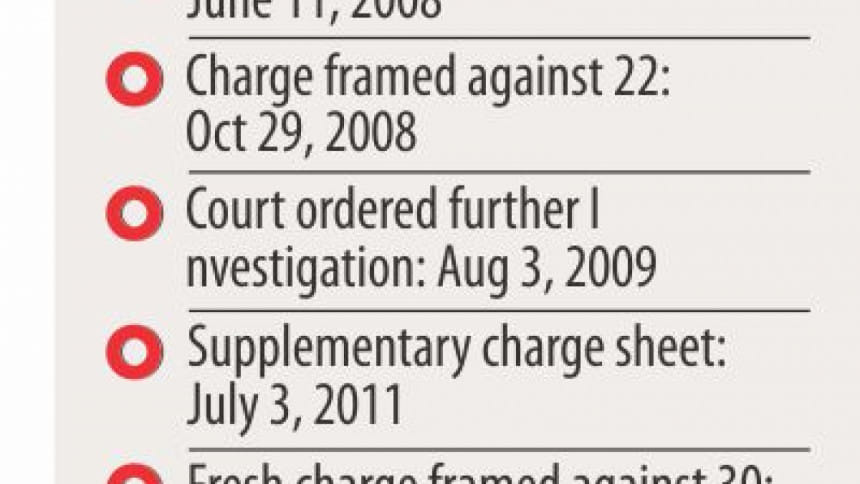
ARGUMENTS
According to the prosecution, the grenade attack on Awami League rally was the outcome of a criminal conspiracy which was finalised at Hawa Bhaban, and at the residence Pintu with Tarique giving the ultimate endorsement.
Hawa Bhaban, the BNP chief's political office during the four-party rule in 2001-06, had become the alternative centre of power of the government.
The accused came together to have their common interest served by killing the AL chief.
Tarique and his cohorts intended to assassinate Hasina and other AL leaders so that the then government could remain in power “permanently”, the prosecution said.
Executed militant leader Mufti Abdul Hannan and his cohorts wanted to establish "fanatic Islam" in the country.
The ministers or lawmakers involved in the plot wanted further promotion and police and intelligence officials looked to be in the government's good books.
They said the grenades were brought from Pakistan by Pintu's brother Maulana Tajuddin. Before August 21, the accused held meetings in at least 10 places in the capital, including Hawa Bhaban, attended among others by Tarique, Babar and Pintu.
After the carnage, the prosecution said, police were reluctant to find out the real culprits, rather destroyed evidence and misled investigation by staging the Joj Mia drama. Detectives and people close to the then government helped Tajuddin flee.
The defence counsels on the other hand termed the incident tragic, but alleged that investigators failed to unearth the mystery and find out the perpetrators.
In the name of further investigation during the AL rule, BNP leaders, police and intelligence officials were falsely implicated, they added.
The defence also said the prosecution solely depended on Huji leader Mufti Hannan's second confessional statement, which was given under duress.
Punishing the accused on the basis of that statement and without having any other independent evidence would be a blunder, they said.

 For all latest news, follow The Daily Star's Google News channel.
For all latest news, follow The Daily Star's Google News channel. 

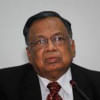
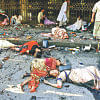
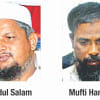
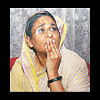



Comments